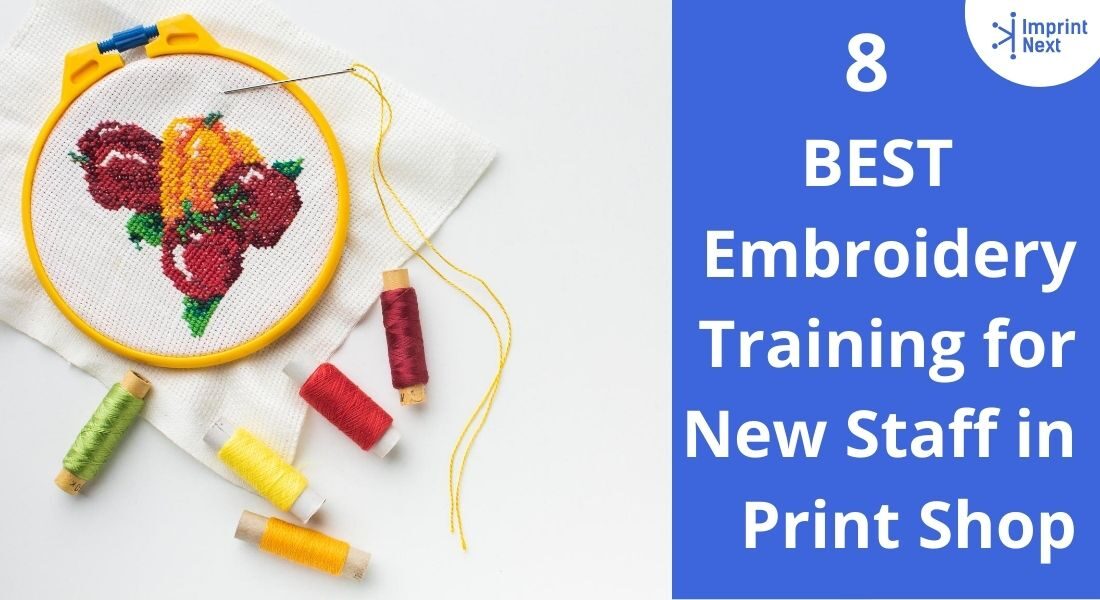
Last Updated on: 6th November 2024, 09:42 pm
Progress of your print shop not only depends on your efficiency but also your staff/employees. Embroidery needs a lot of skill. Simply hiring a new, unskilled employee is the wastage of time and money. Unless you train them to be perfect at the work.
Further, adding a new employee to your shop is a revenue burden on you. A decision that should bring fruitful results.
In the same way, Time spent in training takes dedication, patience, and empathy, but it can pay for itself through increased efficiency and more profitable production.
It is your training and delivery that will set up new employees to determine success or failure or your business.
Want to Boost Your Print Shop Revenue?
Schedule a free consultation
For a real learning curve, establish some short- and long-term goals with clear expectations.
1. Clarity in Communication:
Information should include what you expect, how quickly you hope to achieve it, and the role you expect to play in your overall business plan with the new hire.
Communicate above all; the amount of communication that you have with your new hire will determine how fast and effective that person meets your expectations.

Do you have printers? Are those printers sitting idle?
Become a Print-on-Demand dropshipping app like Printful or Printify. Dropship your merchants' orders.
Unlimited Merchant stores. Dropship and Fulfil Merchants' orders. Manage merchant invoice, sales commission, etc. Merchants sell the designed products in shopify, etsy stores, etc.
Know moreProviding an overview of what the employee needs to know will strengthen his foundation within your company. Taking stock of growth, strengths, and weaknesses
You may come up with a manual to refer to for the employee. And, with your new employee, explore what training strategy fits best for them
2. Should Know How to Operate Machines:
Since each embroidery machine works differently, training may need to provide more than one manufacturer’s details, depending on the equipment in your store. Keep handy books, and promote study.
It may be necessary to provide training on several different machines. Perhaps only start with one machine that will allow the new employee to gain confidence before they branch out to other machines.
Pick the embroidery machine that your new recruit would most likely use and promote familiarity with its use.
Learning the method of tracing is important for avoiding serious harm to the machine. Hitting a hoop will break down reciprocators, which can contribute to time-lapse and costly repairs.
3. Hooping Requires Patience:
If it’s a required type of evil or art, hooping takes patience and a sense of what’s right. Taut and tight can sound similar to words, but
Too close hooping can lead to puckering and inappropriate outcomes. When you are moving the inner hoop through the outer hoop using a rubber mace,

Boston based custom slide sandal maker has become $10 Million company using an online designer and unique growth marketing.
Read moreIf your hoops are too tight. Set all of your hoops the same for broad work, and keep them that way. So stop pulling or tugging on the fabric after it has been hooped, by all way. The use of a quality stabilizer would ease the process of hooping and give the best performance.
4. Cutaway or Tearaway stabilizer:
Most embroidery is performed with a cutaway stabilizer. Not only do cutaway stabilizers have maximum stability, but they also last throughout the garment ‘s life.
Tearaway stabilizers can only be used if the fabric itself is able to sustain the pattern over the entire life of the garment.
Choosing a tearaway for the convenience of pulling it away vs. carefully cutting a backup will cost you repeat business if your customer does not return due to poor quality and performance delivery.
Consider experimenting with the newer no-show options on the market today, They work very well with lightweight dress shirts, oxford cloth and especially well with the materials used on performancewear
5. Train to Use Thread:
Train your new employee in recognizing the characteristics of various threads for the embroidery. If you use rayon or polyester thread mainly on your computers, make sure you have clarified the reason for this.
Choose the thread based on the end product; if your customer is likely to place a broken product in wash water containing bleach, select the thread of polyester.
Thread solving is an important lesson to understand. Small lettering or fine detail logos would better run on a thinner, 60-weight thread. Customers looking for something special to differentiate them may prefer metallic thread.
Some threads may need a change of needle whether they are thicker or thinner than 40-weight threads of general use.
New workers need to learn how to set sufficient upper-thread and bobbin tensions to help various types of thread while preventing certain problems from birds nests and looping.
Also, remember to test the correct system speeds for better results based on various types of threads.
6. Knowing the appropriate Needle:
Knowing the right needle to use for each project and proper installation are essential to good performance and productivity. Needles can have a significant impact on performance.
Using the wrong needle with a special thread requiring a particular needle size makes unnecessary breaks in the thread.
Using needles that can’t hold up to thick caps can lead to breaking or excessive deflection, and problems of poor quality that would result in spoilage. And with sharp needles on other fragile fabrics can trigger holes and cuts.
Resolving issues resulting from making the incorrect choice of needle is inefficient and leads to downtime.
7. Regular Maintenance of Embroidery Machine:
Knowing the right needle to use for each project and proper installation are essential to good performance and productivity. Needles can have a significant impact on performance.
Using the wrong needle with a special thread requiring a particular needle [size] makes unnecessary breaks in the thread.
Using needles that can’t hold up to thick caps can lead to breaking or excessive deflection, and problems of poor quality that would result in spoilage. And with sharp needles on other fragile fabrics
Can trigger holes and cuts. Resolving issues resulting from making the incorrect choice of needle is inefficient and leads to downtime guidelines when it comes to maintenance
You would not purchase a brand new car and neglect to do oil changes and all of the other recommended maintenance that comes with it.
You should do the same for your embroidery machines.
Technicians are costly and have busy schedules, so setting up a regular machine-maintenance schedule by the day, week, and month depending on your volume will save money in the long run.
If your machine is working hard for you.
Oil your embroidery machine daily, or at least weekly. Good maintenance will really pay off.
8. Organize your staff for Efficiency:
If you have agreed to hire more employees, you will have to focus not just on making money but also on saving time. Think of your new hire as both an opportunity, and instill good habits in that employee and the ability to make knowledgeable decisions from the start.
That’s where full-circle communication comes in and will help make your shop efficient and profitable. Implementing and maintaining efficient processes in your shop requires proper training, especially as regards knowledge.
Only when everyone in your organization sees that information is being recorded regularly, completely and in the same format, will they see that information as useful and trustworthy.
Conclusion:
Beyond streamlining order information, good habits should be initiated with and encouraged by new hires. “Only efficient machines are not sufficient. We need expert staff/employees too.
To find the right tools, equipment, and instructions, all traveling should be minimized. And each station should have a full collection of all the essential equipment, stabilizers, adhesives, and anything the operator may need to cut down on the footsteps and search for supplies.







